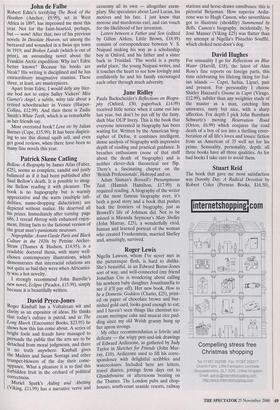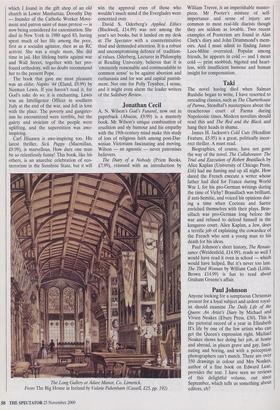Stuart Reid
The book that gave me most satisfaction was Dorothy Day: A Radical Devotion by Robert Coles (Perseus Books, $16.50), which I found in the gift shop of an old church in Lower Manhattan. Dorothy Day — founder of the Catholic Worker Move- ment and patron saint of mass protest — is now being considered for canonisation. She died in New York in 1980 aged 83, having spent much of her life among the poor, first as a socialist agitator, then as an RC activist. She was a single mum. She did time in jail. Her lifelong battle against war and Wall Street, together with her pro- found orthodoxy, will no doubt recommend her to the present Pope.
The book that gave me most pleasure was an oldie: Naples '44 (Eland, £9.99) by Norman Lewis. If you haven't read it, for God's sake do so: it is enchanting. Lewis was an Intelligence Officer in southern Italy at the end of the war, and fell in love with the place. The poverty and gangster- ism he encountered were terrible, but the gaiety and stoicism of the people were uplifting, and the superstition was awe- inspiring.
Carl Hiaasen is awe-inspiring too. His latest thriller, Sick Puppy (Macmillan, £9.99), is marvellous. How dare one man be so relentlessly funny! This book, like his others, is an anarchic celebration of eco- terrorism in the Sunshine State, but it will win the approval even of those who wouldn't much mind if the Everglades were concreted over.
David S. Oderberg's Applied Ethics (Blackwell, £14.99) was not among the year's set books, but it landed on my desk at The Spectator with a counterintuitive thud and demanded attention. It is a robust and uncompromising defence of tradition- al values. Oderberg, Lecturer in Philosophy at Reading University, believes that it is `eminently reasonable and commendable to common sense' to be against abortion and euthanasia and for war and capital punish- ment. Not one for Polly Toynbee, I sense, and it might even alarm the leader writers of the Salisbury Review.






























































































 Previous page
Previous page